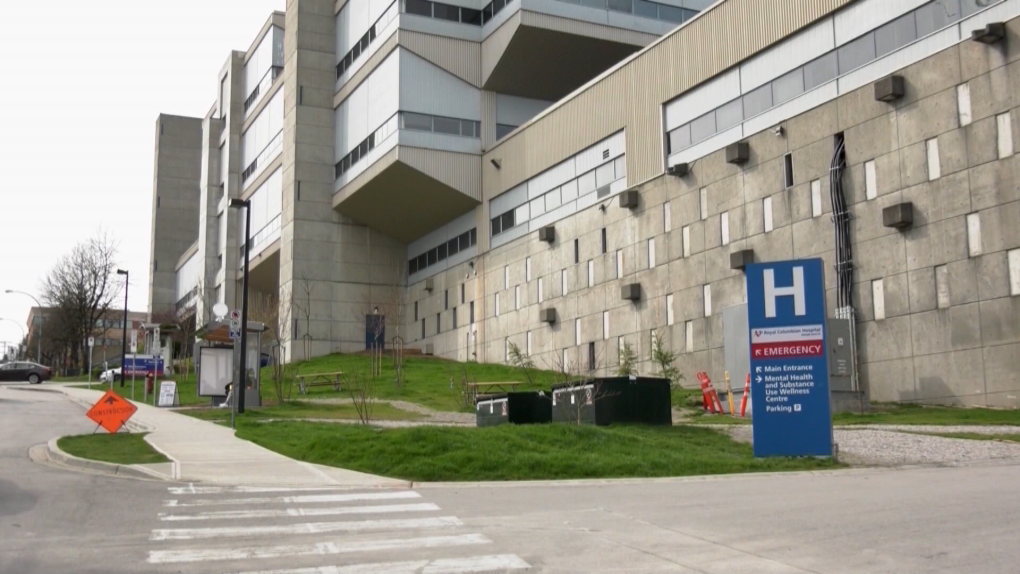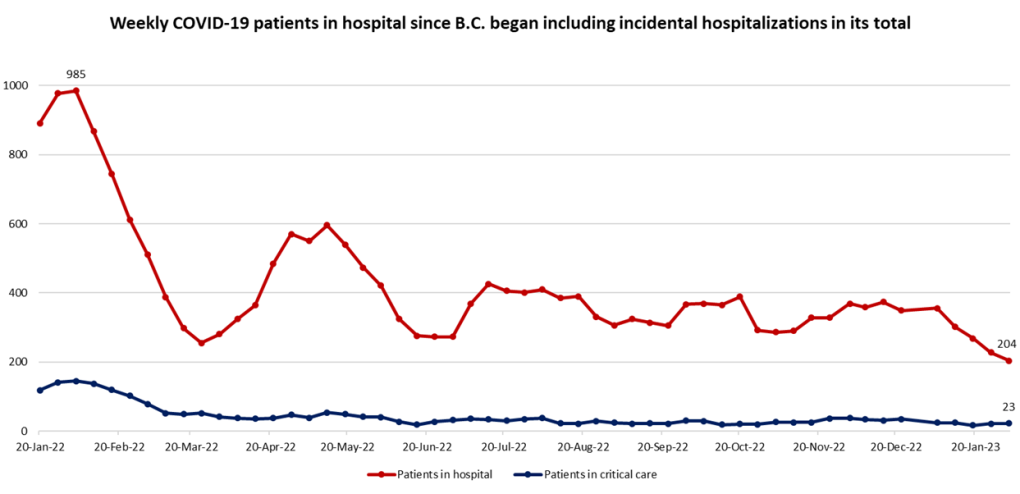Number in hospital with COVID-19 in B.C. hits another new low in latest update

The number of patients with COVID-19 in B.C. hospitals declined again this week, once again reaching a low not seen since before the province began including incidental hospitalizations in its count.
The B.C. Centre for Disease Control reported 204 test-positive patients in hospitals across the province Thursday, down from 228 last week, which was itself the lowest level seen in more than a year.
 The number of people in hospital with COVID-19 in B.C. on Thursdays since the province switched to a "hospital census" model is shown. (CTV)
The number of people in hospital with COVID-19 in B.C. on Thursdays since the province switched to a "hospital census" model is shown. (CTV)
The BCCDC began including incidental cases – meaning those in which a person was admitted to hospital for something other than COVID-19 and tested positive once they got there – in its total in January 2022, near the peak of the first wave of Omicron-variant infections.
The count of hospitalized people on Thursdays peaked at 985 shortly after the switch in reporting methods, but had never fallen below 255 in a weekly update until last week.
Health officials estimate that between 40 and 50 per cent of hospitalizations reported each week are caused by severe cases of COVID-19, while the rest are incidental.
Applying the estimated proportion of non-incidental cases provided by public health officials to the current count suggests roughly 82 to 102 people are currently hospitalized because of the disease.
Tracking the data back to before the switch, the last time the BCCDC reported fewer than 204 people in hospital with the coronavirus was Dec. 28, 2021, when the total was 193.
That total, however, was intended to reflect all patients with severe enough cases of COVID-19 to require hospitalization.
The last time the BCCDC reported a hospitalized population below 100 was in August 2021, before the Omicron variant had been named.
OTHER NEW DATA
Thursday's update from the BCCDC also came with continued declines in new hospital admissions (which are different from the currently hospitalized population) and newly confirmed infections.
There were 293 new, lab-confirmed cases of COVID-19 during the week of Jan. 22 to 28, the most recent "epidemiological week" for which data is available.
That's a substantial decrease – roughly 28 per cent – from the 408 new cases the BCCDC reported last week for the period of Jan. 15 to 21.
Weekly caseloads are not considered representative of the total transmission of COVID-19 in B.C., because they only include the results of lab-based PCR tests, which are available for people with coronavirus symptoms in only a limited number of situations.
Still, though experts estimate that the official case count is off by roughly 100-fold, it has generally moved in the same direction as other indicators like hospitalizations and wastewater surveillance since the province adopted its current, limited testing strategy.
New hospital admissions tell a similar story this week. The BCCDC reported just 73 of them for the week ending Jan. 28, down from 104 initially reported last week for the period ending Jan. 21.
Last week's total has since been revised upwards to 123, and this week's total will be revised upwards in next week's update.
This week's total is beginning at a lower point than last week's did, however, and the revised total for last week is the second-lowest the BCCDC has reported since it switched to weekly data updates in April 2022.
Wastewater surveillance data, which captures a much broader sample of the population than the official case count, had not been updated at the time of writing Thursday.
The most recent wastewater data available on the BCCDC website showed a declining trend in coronavirus concentrations across all treatment plants, though the rate of decline was slowing in some regions.
CTVNews.ca Top Stories

Pearson gold heist suspect arrested after flying into Toronto from India
Another suspect is in custody in connection with the gold heist at Toronto Pearson International Airport last year, police say.
Justin and Hailey Bieber are expecting their first child together
Hailey and Justin Bieber are going to be parents. The couple announced the news on Thursday on Instagram, both sharing a video that showcases Hailey Bieber's growing belly.
From outer space? Sask. farmers baffled after discovering strange wreckage in field
A family of fifth generation farmers from Ituna, Sask. are trying to find answers after discovering several strange objects lying on their land.
B.C. man used Bobcat as 'weapon' while chasing away homeless people, judge says
A B.C. man has been convicted of assault with a weapon after using a skid-steer Bobcat to chase two homeless people from his lawn, injuring one of them in the process.
Debate on abortion rights erupts on Parliament Hill, Poilievre vows he won't legislate
A Conservative government led by Pierre Poilievre would not legislate on, nor use the notwithstanding clause, on abortion, his office says, as anti-abortion protesters gather on Parliament Hill.
Ontario family receives massive hospital bill as part of LTC law, refuses to pay
A southwestern Ontario woman has received an $8,400 bill from a hospital in Windsor, Ont., after she refused to put her mother in a nursing home she hated -- and she says she has no intention of paying it.
Miss Teen USA steps down just days after Miss USA's resignation
Miss Teen USA resigned Wednesday, sending further shock waves through the pageant community just days after Miss USA said she would relinquish her crown.
'Nobody should be getting away with murder': Grieving mother speaks out after son killed in North Preston, N.S.
A grieving mother is speaking out after her 36-year-old son was shot and killed in North Preston, N.S., Wednesday night.
Toronto-area dessert shop featured by Keith Lee forced to move after zoning complaint
A small Ajax dessert shop that recently received a glowing review from celebrity food critic Keith Lee is being forced to move after a zoning complaint was made following the social media influencer’s visit last month.
































